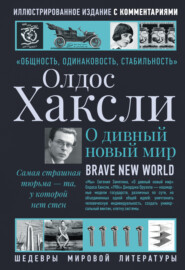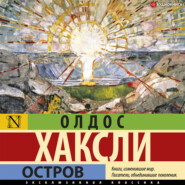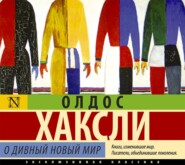По всем вопросам обращайтесь на: info@litportal.ru
(©) 2003-2024.
✖
О дивный новый мир / Brave New World
Автор
Год написания книги
2020
Теги
Настройки чтения
Размер шрифта
Высота строк
Поля
“Embryos are like photograph film,” said Mr. Foster, as he pushed open the second door. “They can only stand red light[6 - They can only stand red light – Они могут выносить только красный свет].”
The sultry darkness here was visible and crimson, like the darkness of closed eyes on a summer’s afternoon. Row upon row and tier above tier of bottles glinted like rubies, and among the rubies moved men and women with purple eyes and all the symptoms of lupus. There was a hum and rattle of machinery in the air.
“Give them a few figures, Mr. Foster,” said the Director, who was tired of talking.
Two hundred and twenty metres long, two hundred wide, ten high. He pointed upwards. The students lifted their eyes towards the distant ceiling.
Three tiers of racks: ground floor level, first gallery, second gallery. Near them three red ghosts were unloading bottles from a moving staircase. Each bottle could be placed on one of fifteen racks. Each rack was a conveyor traveling at the rate of thirty-three and a third centimetres an hour[7 - at the rate of thirty-three and a third centimetres an hour – со скоростью 33,3 см/ч]. Two hundred and sixty-seven days at eight metres a day. One round of the cellar at ground level, one on the first gallery, half on the second, and on the two hundred and sixty-seventh morning, sent to the Decanting Room. Independent existence—so called.
“But in that time,” Mr. Foster concluded, “we’ve managed to do a lot to them.”
“That’s the spirit I like,” said the Director once more. “Let’s walk around. You tell them everything, Mr. Foster.”
Mr. Foster duly told them.
Told them of the growing embryo on its bed of peritoneum. Explained why it had to be stimulated with drugs. Described the artificial circulation installed in every bottle. Showed them the simple mechanism that shook the embryos into familiarity with movement. Told them about the “trauma of decanting,” and the test for sex taking place in the neighborhood of Metre 200. Explained the system of labelling—a T for the males, a circle for the females and for those who were destined to become freemartins a question mark, black on a white ground.
“One fertile ovary in twelve hundred—that would really be enough for our purposes,” said Mr. Foster. “But we want to have a good choice. And we must always have an enormous margin of safety. So we allow as many as thirty per cent of the female embryos to develop normally. The others get a dose of male sex-hormone every twenty-four metres for the rest of the course. Result: they’re guaranteed sterile. Which brings us at last,” continued Mr. Foster, “to the much more interesting human invention.” He rubbed his hands. “We also predestine and condition. We decant our babies as Alphas or Epsilons, as future sewage workers or future…” He was going to say “future World controllers,” but corrected himself “… future Directors of Hatcheries.” instead.
They were passing Metre 320 on Rack 11. A young Beta-Minus mechanic was busy with screw-driver and spanner on the blood-surrogate pump of a passing bottle. The hum of the electric motor deepened the more he turned the nuts. A final twist and he was done. He moved two paces down the line and began doing the same on the next pump.
“Reducing the number of revolutions per minute,” Mr. Foster explained. “The surrogate goes round slower; therefore passes through the lung at longer intervals; therefore gives the embryo less oxygen.”
“But why do you want to do that?” asked a student.
“Ass![8 - Ass! – Кретин!]” said the Director. “Hasn’t it occurred to you that an Epsilon embryo must have an Epsilon environment as well as an Epsilon heredity?”
It evidently hadn’t occurred to him. He looked confused.
“The lower the caste,” said Mr. Foster, “the shorter the oxygen.” The first organ affected was the brain. After that the skeleton. At seventy per cent of normal oxygen you got dwarfs. At less than seventy eyeless monsters.
“Who are no use at all,” concluded Mr. Foster. “In Epsilons, we don’t need human intelligence.”
Didn’t need and didn’t get it. But though the Epsilon mind was mature at ten, the Epsilon body was not fit to work till eighteen. If the physical development could be speeded up till it was as quick, say, as a cow’s, what an enormous saving to the Community!
“Enormous!” murmured the students. Mr. Foster’s enthusiasm was infectious.
He became rather technical; spoke of the abnormality which made men grow so slowly; postulated a mutation to account for it[9 - postulated a mutation to account for it – предположил, что в этом виновата мутация]. Could the effects of this mutation be undone? Could the individual Epsilon embryo be reverted to the normality of dogs and cows? That was the problem.
Their wanderings had brought them to the neighborhood of Metre 170 on Rack 9. From this point onwards Rack 9 was enclosed and the bottle spent the remainder of their journey in a kind of tunnel, interrupted here and there by openings two or three metres wide.
“Heat conditioning,” said Mr. Foster.
Hot tunnels alternated with cool tunnels. Cold tunnels also produced hard X-rays. By the time they were decanted the embryos had a horror of cold. They were predestined to emigrate to the tropics, to be silk spinners and steel workers. “We condition them to thrive on heat,” concluded Mr. Foster.
“And that,” said the Director, “that is the secret of happiness and virtue—liking what you’ve got to do. We aim at that: making people like their unescapable social destiny.”
In a gap between two tunnels, a nurse was delicately probing with a long fine syringe into the contents of passing bottles.
“Well, Lenina,” said Mr. Foster.
The girl turned with a start. One could see that, for all the lupus and the purple eyes, she was very pretty.
“Henry!”
“What are you giving them?” asked Mr. Foster, making his tone very professional.
“Oh, the usual typhoid and sleeping sickness.”
“Tropical workers start being inoculated at Metre 150,” Mr. Foster explained to the students. Then, turning back to Lenina, “Ten to five on the roof this afternoon,” he said, “as usual.”
On Rack 10 rows of next generation’s chemical workers were being trained in the toleration of lead, caustic soda, tar, chlorine. The first of a batch of two hundred and fifty rocket-plane engineers was just passing the eleven hundred metre mark on Rack 3. A special mechanism kept their containers in constant rotation. “To improve their sense of balance,” Mr. Foster explained.
“And now,” Mr. Foster went on, “I’d like to show you some very interesting conditioning for Alpha Plus Intellectuals. We have a big batch of them on Rack 5. They’re round about Metre 900. You can’t really do any useful intellectual conditioning till the fetuses have lost their tails. Follow me.”
But the Director had looked at his watch. “Ten to three,” he said. “No time for the intellectual embryos, I’m afraid. We must go up to the Nurseries before the children have finished their afternoon sleep.”
“At least one glance at the Decanting Room,” pleaded Mr. Foster.
“Very well then.” The Director smiled. “Just one glance.”
Chapter Two
Mr. Foster was left in the Decanting Room. The D.H.C. and his students stepped into the nearest lift and were carried up to the fifth floor.
INFANT NURSERIES. NEO-PAVLOVIAN CONDITIONING ROOMS, announced the notice board.
The Director opened a door. They were in a large bare room, very bright and sunny. Half a dozen nurses were setting out bowls of roses [10 - setting out bowls of roses – расставляли горшки роз]in a long row across the floor. Thousands of petals, silkily smooth.
The nurses stiffened to attention [11 - stiffened to attention – замерли в ожидании]as the D.H.C. came in.
“Set out the books,” he said curtly.
In silence the nurses obeyed his command and set out nursery book in between the bowls, each opened at a colourful image of beast or fish or bird.
“Now bring in the children.”
They hurried out of the room and returned in a minute or two, each pushing a kind of tall dumb-waiter with eight-month-old babies, all exactly alike and all dressed in khaki.
“Put them down on the floor.”
The infants were unloaded.
“Now turn them so that they can see the flowers and books.”
Turned, the babies at once fell silent, then began to crawl towards those clusters of colours. Babies squealed with excitement.
The Director rubbed his hands. “Excellent!” he said.
The sultry darkness here was visible and crimson, like the darkness of closed eyes on a summer’s afternoon. Row upon row and tier above tier of bottles glinted like rubies, and among the rubies moved men and women with purple eyes and all the symptoms of lupus. There was a hum and rattle of machinery in the air.
“Give them a few figures, Mr. Foster,” said the Director, who was tired of talking.
Two hundred and twenty metres long, two hundred wide, ten high. He pointed upwards. The students lifted their eyes towards the distant ceiling.
Three tiers of racks: ground floor level, first gallery, second gallery. Near them three red ghosts were unloading bottles from a moving staircase. Each bottle could be placed on one of fifteen racks. Each rack was a conveyor traveling at the rate of thirty-three and a third centimetres an hour[7 - at the rate of thirty-three and a third centimetres an hour – со скоростью 33,3 см/ч]. Two hundred and sixty-seven days at eight metres a day. One round of the cellar at ground level, one on the first gallery, half on the second, and on the two hundred and sixty-seventh morning, sent to the Decanting Room. Independent existence—so called.
“But in that time,” Mr. Foster concluded, “we’ve managed to do a lot to them.”
“That’s the spirit I like,” said the Director once more. “Let’s walk around. You tell them everything, Mr. Foster.”
Mr. Foster duly told them.
Told them of the growing embryo on its bed of peritoneum. Explained why it had to be stimulated with drugs. Described the artificial circulation installed in every bottle. Showed them the simple mechanism that shook the embryos into familiarity with movement. Told them about the “trauma of decanting,” and the test for sex taking place in the neighborhood of Metre 200. Explained the system of labelling—a T for the males, a circle for the females and for those who were destined to become freemartins a question mark, black on a white ground.
“One fertile ovary in twelve hundred—that would really be enough for our purposes,” said Mr. Foster. “But we want to have a good choice. And we must always have an enormous margin of safety. So we allow as many as thirty per cent of the female embryos to develop normally. The others get a dose of male sex-hormone every twenty-four metres for the rest of the course. Result: they’re guaranteed sterile. Which brings us at last,” continued Mr. Foster, “to the much more interesting human invention.” He rubbed his hands. “We also predestine and condition. We decant our babies as Alphas or Epsilons, as future sewage workers or future…” He was going to say “future World controllers,” but corrected himself “… future Directors of Hatcheries.” instead.
They were passing Metre 320 on Rack 11. A young Beta-Minus mechanic was busy with screw-driver and spanner on the blood-surrogate pump of a passing bottle. The hum of the electric motor deepened the more he turned the nuts. A final twist and he was done. He moved two paces down the line and began doing the same on the next pump.
“Reducing the number of revolutions per minute,” Mr. Foster explained. “The surrogate goes round slower; therefore passes through the lung at longer intervals; therefore gives the embryo less oxygen.”
“But why do you want to do that?” asked a student.
“Ass![8 - Ass! – Кретин!]” said the Director. “Hasn’t it occurred to you that an Epsilon embryo must have an Epsilon environment as well as an Epsilon heredity?”
It evidently hadn’t occurred to him. He looked confused.
“The lower the caste,” said Mr. Foster, “the shorter the oxygen.” The first organ affected was the brain. After that the skeleton. At seventy per cent of normal oxygen you got dwarfs. At less than seventy eyeless monsters.
“Who are no use at all,” concluded Mr. Foster. “In Epsilons, we don’t need human intelligence.”
Didn’t need and didn’t get it. But though the Epsilon mind was mature at ten, the Epsilon body was not fit to work till eighteen. If the physical development could be speeded up till it was as quick, say, as a cow’s, what an enormous saving to the Community!
“Enormous!” murmured the students. Mr. Foster’s enthusiasm was infectious.
He became rather technical; spoke of the abnormality which made men grow so slowly; postulated a mutation to account for it[9 - postulated a mutation to account for it – предположил, что в этом виновата мутация]. Could the effects of this mutation be undone? Could the individual Epsilon embryo be reverted to the normality of dogs and cows? That was the problem.
Their wanderings had brought them to the neighborhood of Metre 170 on Rack 9. From this point onwards Rack 9 was enclosed and the bottle spent the remainder of their journey in a kind of tunnel, interrupted here and there by openings two or three metres wide.
“Heat conditioning,” said Mr. Foster.
Hot tunnels alternated with cool tunnels. Cold tunnels also produced hard X-rays. By the time they were decanted the embryos had a horror of cold. They were predestined to emigrate to the tropics, to be silk spinners and steel workers. “We condition them to thrive on heat,” concluded Mr. Foster.
“And that,” said the Director, “that is the secret of happiness and virtue—liking what you’ve got to do. We aim at that: making people like their unescapable social destiny.”
In a gap between two tunnels, a nurse was delicately probing with a long fine syringe into the contents of passing bottles.
“Well, Lenina,” said Mr. Foster.
The girl turned with a start. One could see that, for all the lupus and the purple eyes, she was very pretty.
“Henry!”
“What are you giving them?” asked Mr. Foster, making his tone very professional.
“Oh, the usual typhoid and sleeping sickness.”
“Tropical workers start being inoculated at Metre 150,” Mr. Foster explained to the students. Then, turning back to Lenina, “Ten to five on the roof this afternoon,” he said, “as usual.”
On Rack 10 rows of next generation’s chemical workers were being trained in the toleration of lead, caustic soda, tar, chlorine. The first of a batch of two hundred and fifty rocket-plane engineers was just passing the eleven hundred metre mark on Rack 3. A special mechanism kept their containers in constant rotation. “To improve their sense of balance,” Mr. Foster explained.
“And now,” Mr. Foster went on, “I’d like to show you some very interesting conditioning for Alpha Plus Intellectuals. We have a big batch of them on Rack 5. They’re round about Metre 900. You can’t really do any useful intellectual conditioning till the fetuses have lost their tails. Follow me.”
But the Director had looked at his watch. “Ten to three,” he said. “No time for the intellectual embryos, I’m afraid. We must go up to the Nurseries before the children have finished their afternoon sleep.”
“At least one glance at the Decanting Room,” pleaded Mr. Foster.
“Very well then.” The Director smiled. “Just one glance.”
Chapter Two
Mr. Foster was left in the Decanting Room. The D.H.C. and his students stepped into the nearest lift and were carried up to the fifth floor.
INFANT NURSERIES. NEO-PAVLOVIAN CONDITIONING ROOMS, announced the notice board.
The Director opened a door. They were in a large bare room, very bright and sunny. Half a dozen nurses were setting out bowls of roses [10 - setting out bowls of roses – расставляли горшки роз]in a long row across the floor. Thousands of petals, silkily smooth.
The nurses stiffened to attention [11 - stiffened to attention – замерли в ожидании]as the D.H.C. came in.
“Set out the books,” he said curtly.
In silence the nurses obeyed his command and set out nursery book in between the bowls, each opened at a colourful image of beast or fish or bird.
“Now bring in the children.”
They hurried out of the room and returned in a minute or two, each pushing a kind of tall dumb-waiter with eight-month-old babies, all exactly alike and all dressed in khaki.
“Put them down on the floor.”
The infants were unloaded.
“Now turn them so that they can see the flowers and books.”
Turned, the babies at once fell silent, then began to crawl towards those clusters of colours. Babies squealed with excitement.
The Director rubbed his hands. “Excellent!” he said.
















